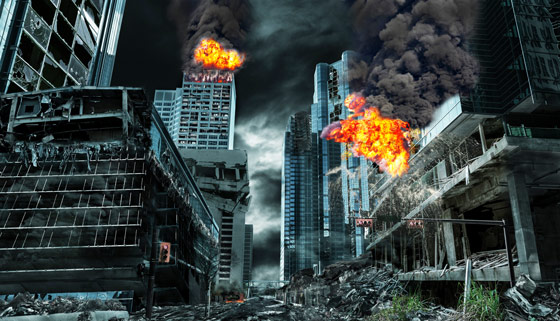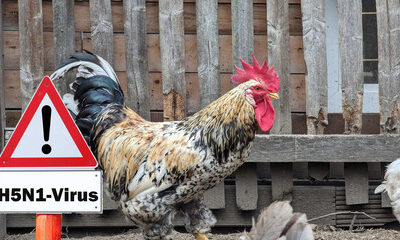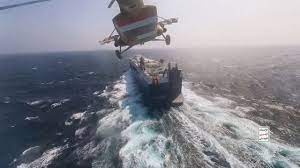This article was originally published by Selco at The Organic Prepper

We all tend to pay much attention to acquiring stuff – physical things – in order to be more prepared, but we often fail to prepare ourselves more, physically and mentally. You need to be preparing for the things that are most likely in your regular, everyday life. Then expect that you’ll be under immense pressure.
Everything is different when you’re under pressure but you can prepare yourself for this too.
There are many ways how we can prepare ourselves more, simple and fun things like hiking or camping are great to test some of your skills and gear too. A popular myth is that we have to be physically prepared only through more “macho” activities like martial arts or shooting at the range and similar.
It is person-to-person based and sometimes we are limited by our own living conditions to practice some of the above activities. If you are living a day to day life in a big city with your family and kids, working a regular job, you find yourself very easily in a situation where all your prepping activities are based on watching YouTube videos or similar maybe, and finding a way to implement that into your own settings.
You have to prep based on your everyday life and situations.
Actually, you need to prep based on your own situation, and if that means day to day job, big city, kids, public transport… you need to implement all those factors in your prep plan.
We have people living in cities that form their survival philosophy based on the idea that they gonna be surviving in wilderness, or people preparing for end of the world because they think asteroid will impact while they do not see that they are living actually next to the part of city where organized crime rules.
If organized crime is very powerful now, they should conclude that it is going to be much stronger once when the SHTF.
We should all prep for the time where there are not enough resources for you and all the people around you. Because when that happens, violence will come.
Of course, you need to know how to start fire or set up a shelter in woods simply because you may find yourself in the woods and wilderness because you ran away from the city when SHTF.
But it makes sense to pay more attention to your immediate surroundings.
Try the “everyday life” exercise
It does not have to be all physical training either. Start it on an intellectual level.
Use one week of your ordinary life as the beginning of your setup.
Monitor and write down your daily activities every day of the week, and then throw in an everyday imaginary SHTF event. A very basic and simplified example may look like this:
- Every day you drive to your job at 8:00 (or using public transport)
- You are at job from 9-5 (your kids are at school from 8-3)
- You are driving back from work from 5 to 6
Now, imagine for the sake of that exercise that something big and bad happened:
- while you are driving to your job (and while your kids are at the school)
- while you are at work
- while you are driving back from work or school
Now gradually throw in complications. For example, the usual road home is blocked, cell phones are not working, you do not have enough cash or fuel, or nobody accept cards at the gas stations…
How much food or weapon or ammo should you have with you? What is an alternate way of communication with kids? Do you have pre-arranged meeting points with the kids if something bad happens? Have you built a cache somewhere?
The examples of possible complications are numerous and my point here is not to go and talk about all possible complications. I want you to take one ordinary day of your everyday life and imagine something bad happening in the middle of it. Then start a mental exercise of solving that situation.
An important thing here to mention is that please do not let this make you become paranoid, No matter how well you plan, you can not cover all possibilities and complications. Also, your plan cannot be too complicated, otherwise you’ll fail for sure.
Think about the basics: safety and security, being together with your family when something bad happens, and getting to a safe location.
Stop planning for far-fetched scenarios when you haven’t covered the likely ones.
The main point of this is: there is no sense in learning high end skills if you do not have a setup to deal with an immediate SHTF that happened during an ordinary day.
Or to put it another way…
There is no sense to know how to start fire with a bow drill if you do not know an alternate and quick way to your home if something bad happens, if you don’t keep enough fuel on hand… and if rest of your family does not know what to do until you get home (or if you do not get home.)
SHTF situation often comes without warning and instructions.
Then add pressure.
I am a big fan of training under the pressure, and that does not necessarily means that you have to deal only with a heavy backpack.
Now pressure and comfort zones are very important in order to understand how good or how bad your plan is.
In one of my last articles I used a perfect example, and we saw again in the comments how easily people (preppers in this case) are getting “kicked” out of their comfort zones.
For some of them the shock was so bad that they actually do not want to “play” anymore. They won’t read the words of a person who has been through difficult times because some of the words are uncomfortable.
The major thing about a SHTF situation is that you will be under pressure and out of your comfort zone during a lot of the time.
You need to get familiar with it.
Panic, confusion, misinformation, fear, and insecurity are all things that WILL happen to you, no matter what you think about it today.
Now without going into the psychology of how those things work, you need to recognize how you operate under those feelings and conditions, so that you may correct yourself today before the SHTF.
Here’s an example of the effects of pressure.
During my last live course, for one of the exercises, after a nice and calm discussion,the students were instructed to leave the house in a hurry and enter the vehicle with all of their gear. There were five of them and they had not used that car before.
The car is OK for 4 persons, but definitely not for 5 of them with all their gear.
They managed to fit somehow. Then, during the driving, the instructor told them to – in 10-15 seconds – reach into their equipment and find important items like knives (weapons), maps (navigation), bandages (first aid) and similar.
The car was driven by the instructor fast and rough, on narrow roads with pretty heavy traffic. The heavy metal music inside the car was blasting very loud.
Most of them failed to find the requested items.
Some of them put important items deep inside their bags (bad organisation of equipment – remember layers?). Others could not concentrate because of the unsafe driving (fear) or because of the very loud music (distraction). Some of them just feel very uncomfortable trying to perform the task.
These are examples only again, but it is a great idea to see how you and your equipment work under under pressure, when you’re distracted, and how well your equipment is organized.
And it would be even better to check all that in your immediate surroundings – where you live and work. Not somewhere far away in that cabin in the woods at your bug out location where all is peaceful. Because remember you need to reach it first.
The drill may look very different for you.
I am not advocating that you sit in a car and drive fast and yell at your family in order to see how they react. Start slowly and see how you and your family or group perform under small amounts of pressure and just outside of your comfort zones.
For you it may be practicing and testing your equipment and skills while you are without electrical power for 24 hours, or without running water or similar.
Start slowly and with the basic things in your everyday life before moving on to more elaborate scenarios.
***
About the Author
Selco survived the Balkan war of the 90s in a city under siege, without electricity, running water, or food distribution. In his online works, he gives an inside view of the reality of survival under the harshest conditions. He reviews what works and what doesn’t, tells you the hard lessons he learned, and shares how he prepares today. He never stopped learning about survival and preparedness since the war. Regardless what happens, chances are you will never experience extreme situations like Selco did. But you have the chance to learn from him and how he faced death for months. Real survival is not romantic or idealistic. It is brutal, hard and unfair. Let Selco take you into that world. Read more of Selco’s articles here: https://shtfschool.com/blog/ And take advantage of a deep and profound insight into his knowledge and advice by signing up for the outstanding and unrivaled online course. More details here: https://shtfschool.com/survival-boot-camp/
Please feel free to share any information from this article in part or in full, giving credit to the author and including a link to The Organic Prepper and the following bio.
Daisy is a coffee-swigging, gun-toting, homeschooling blogger who writes about current events, preparedness, frugality, and the pursuit of liberty on her websites, The Organic Prepper and DaisyLuther.com She is the author of 4 books and the co-founder of Preppers University, where she teaches intensive preparedness courses in a live online classroom setting. You can follow her on Facebook, Pinterest, and Twitter,.










Instead of just relying on firearms for the last 3 years I’ve been learning to use twin broadswords. I practice daily and I’m to the point where I’m sure I could kill an intruder or two quickly. I just don’t want to feel naked and lose hope if something were to happen to my guns or I ran out of ammo. Plus I feel great. I still run through the woods weekly wearing my level III plate carrier.
That’s thinking outside their box!
Got any recommendations on various plates? I picked up a Crye JPC awhile back but haven’t come to a decision on what manufacture of the plates. Looking closely at the ceramic swimmer style but haven’t pulled the pin on any yet.
I just like the AR-500 Level III Mine say “come and take it” on them from the manufacturer. They could withstand multiple hits unlike the ceramic. Just get good trauma pads to put next to your body behind the plates. I bought the IDF brand.
The plates should be slightly curved from the manufacturer.
buy an IBA, IOTV, MTV, or some other bulletproof vest, and put military-grade ceramic plates in it….it always starts an argument, but bottom line, put two people a hundred yards apart, and tell them to start shooting at eachother. i think my chances are better with those, than your chances with an 8×10 plate over your heart.
No argument. That’s a fine choice too. I just want to not eat a bullet!
i bought some plates at a gunshow a while back, and one of the other dealers saw me. he walked over to my booth where i sell military gear, and assed me “why did you buy from THAT guy”…..i knew him too, and said he was cheaper. this guy informs me that HE has test sheets proving what he iis selling, but the guy i bought from has junk….so i bought some from him too, at same price. the lesson here was to check out those plates to make sure they will do what you THINK they will do….gotta be level iv!
learn skills with a fighting knife. I can see how you’re going to find a 40″ broadsword in the middle of the night and deploy it successively in a narrow hallway outside your bedroom.
Broadsword: a “high level” “way out there” skill
Knife skills: actually useful.
Blades are 24 inches, very useful. You cannot get near my body. Someone comes at me with a knife they are dead.
And we all need to be training at a high level. BTW I’m spinning 2 swords at once.
I know of no broadsword with a blade under 30 inches.
I suppose you could be referring to a gladius or similar weapon, but those are not broadswords.
If you’re now telling me you will be defending your bedroom with a pair of spinning gladii in the middle of the night, I’m calling BS. Also, making a blanket statement about “anyone coming at you with a knife” cements my opinion you are blowing smoke.
and by “high level” I mean specialized, ‘only if you are a master at every single other related skill’ type skill… which I suspect you are not. (I’ll admit I’m not, barely anyone is.)
Never said I was going to defend the bedroom with my blades.i have plenty of firearms. You should do more research on bladed weapons. And yes I could cut someone in half if put to it anywhere. I can’t help if others are not as committed to self defense. I do this every day.
Then you need to do more homework on combat blades .Plus I never said I will defend the bedroom with blades first but we do have high ceilings. I practice this every day religiously. I can’t help you’ve sit down on the couch already. You act kinda holier than thou as you don’t know shit about me.
Lol but outside my bedroom they get the AK, AR, or SG.
SHOULD be shotgun INSIDE the house, and battle rifle outside…..most likely never NEED that battle rifle…..until the snivel war starts, of coarse.
Where or whom are you learning from? I tried finding a group that teaches this (HEMA) and only found SCA. While a couple of the guys were OK, they weren’t what I would call teachers. Don’t want to learn bad habits to unlearn down the road.
A friend that’s done martial arts most of his life.
Try this video for a beginning. I hope it will load.
https://www.bing.com/videos/search?q=fighting+with+2+swords&qpvt=fighting+with+2+swords&view=detail&mid=5112D2F8E0559A13F75F5112D2F8E0559A13F75F&rvsmid=C1D91CD2B0026289180CC1D91CD2B0026289180C&FORM=VDMCNR&ajf=100
I did 6 years of dagger with the SCA, its overblown and weighted down with politics and dress-up weirdness, but you can occasionally find a good tutor. Most of the folks are more concerned with being historically accurate than with simple brutality and killing. I was a competitive saber fencer (as in nationally ranked) way back in my early 20’s, but its not a direct translation to anything usable in real world defense scenarios. It does promote a great deal of cardio and short-twitch muscle development, and hand-eye coordination though.
Suggest you talk to some of the more “grounded” SCA folks about your needs (learning technique, practice methods) outside of renfaire season, offer to pay them outside of the SCA ‘environment’… and then find a vet older than 30 who has actually been trained in where to put the blade and with what force and why. Then brush up on your grappling. Any blade encounter (yes, even with a huge broadsword) is going to involve a considerable amount of grappling, punching, etc.
Same here with the swords and knives. Been doing it for quite a while. Ammo does not last forever when we are in a shtf scenario. Knives and swords do. Plus other stuff we can think of!!
thankfully there is plenty of material for clubs, bats, batons, etc just laying around.
It really DOES grow on trees lol
Thankful there are blowhards here to state the obvious.
“Stop planning for far fetched situations”
This is my feeling about the whole preparedness survival fad/way of life.
It is hard enough to live and function in this world without becoming obsessed with things that probably will never happen when so many other things threaten us every day.
IMHO, a good plan is one that is simple, efficient, accomplishes short term and long term objectives.
_
” sit in a car and drive fast and yell at your family in order to see how they react.”
shtf? no way. thats what we called ‘Vacation’ when I was a kid…
https://www.youtube.com/watch?v=JdwyAcJ8j2U&pbjreload=10
“Ideology – that is what gives evildoing its long-sought justification and gives the evildoer the necessary steadfastness and determination… Thanks to ideology, the twentieth century was fated to experience evildoing on a scale calculated in the millions.”
Aleksandr Solzhenitsyn
Nobody has an ideology.
MY test came friday night, on our boy scouts campout. we checked weather, and late afternoon, when we arrived, we find out there was a 40% chance of rain. just 3 hours prior, there was no mention of rain, just cloudy.(i have camped on lakebeds a HUNDRED times). we set up our camp near my 4 wheelers club, so we could help with the event we have every year. we went to sleep friday night knowing there was a “40% chance of rain”. at 1215 i awoke to my tent rainfly being whipped by 20mph winds, and some rain making it inside the tent, however small amount it was, it concerned me. so i put on my fleece and poncho, and shoes, and went back to sleep. i was awakened at 415am to my assistant scoutmaster saying “we gotta go, there’s 2 inches of water in all the tents”. so i get up and step out of my tent into 5 inches of mud, and it’s still downpouring. i think it was raining the whole time. i look at my phone weather and it says 100% for next hour, 90% for the hour after that, and 80% for the next hour, a total of ANOTHER inch of rain,(somebody said it rained 3 inches) so it’s definitely serious. we WERE camped on a dry lakebed, afterall. so i get in the jeep and drive toward the road out, to assess the situation. i see a stream running out of that exit, and into that lake that is right next to our camp, so it’s expanding by the minute. so i suggest they throw all gear onto my jeep trailer, so we can escape the now WET lakebed. and i could see it was time to get all vehicles off the lakebed, before it became impassable, although i had serious doubts at that point that we COULD get them moving. luckily, we had 4 out of the 5 vehicles were 4 wheel drive, and the 2 wheel drive was one of the first to make it off the lake. the scouts did an admirable job of breaking up the camp and loading it on the trailer, even though they were cold and wet. at that point it was important to get on home to dry out and warm up(some of them MAY have been able to salvage the campout, but the devastation to them was mostly 100%). but i had a run to help with at 830, so i couldn’t go home just yet. so i sent my truck and trailer with a parent, and stayed there. the next couple hours were spent pulling motorhomes out of the mud to higher ground on that lakebed. it rained until around 11am. by the time i got back from my rungroup, the lake had already started to recede. it was quite an adventure, and there WERE some lessons to be learned.
find the high spots to camp on
we can’t depend on the weatherman, be it calling FOR rain, or saying it WON’T rain. they can sure be wrong.
we get so used to the weatherman usually being right, that we become complacent
have warm clothes, in a trashbag, that can double as an extra raincoat, if yours gets wet.
waterproof boots….and a CHANGE of shoe/socks
i saw a lot of plastic bags on shoes too.
a REAL raincoat can really be a big difference
point vehicles toward the exit, some were pointed toward the lake that was forming, which made for some anxious moments, whether we could get them turned in the right direction.
pull the plug earlier, i knew it was raining quite a bit, and i should have gotten up and checked the ground around us.
stow everything away,into trailers and under tables so if it DOES rain, it’s protected(this WAS done, so made things a lil easier)
clean and dry everything right away, or it will be a big mess that’s harder to clean up.
in the end, it was just a comedy of errors, and i hope my scouts don’t think it’s always like this when it rains. we had 3 brand new scouts, that have never camped(with us at least), and i hate to think they might quit because of this one. camping, or hiking in the rain doesn’t HAVE to be like this, it can be fun, if prepared. but there was little we could have done to be prepared for this one, except for finding higher ground. MY tent was fairly dry, even though i was having the most trouble with that rainfly in the wind.as it turns out, i had ALL the bases covered for myself, and even several others. but their will was broken.
Get yourself a “Dry bag” to put your clothes in and carry in your ruck. Midway had some good used ones (or did) and I picked up several that appeared brand new for a round 10 bux apiece.
better yet, put clothes in a trash bag, so it can double as a raincoat after yours gets soaked/torn/lost. that’s what i tell my scouts to do. i sell military gear, so i got lots of drybags, but they won’t work as a raincoat when something happens to your favorite slicker.
take it from a paddler: use the drybag. Totally worth it. If insist on using a substandard raincoat, just get a cheap plastic poncho.
MY scouts are all from the ghetto, and their parents aint buyin’ no drybags, even though i can sell them some for 5$….trashbag is as far as THEY are going……and very few even HAVE a raincoat, even though i can sell them goretex’s for 45$.
Probably one of the best articles on prepping I’ve seen lately.
The reality is that wilderness survival is a no-go for anyone who is not an experienced and capable hunter, fisherman, or trapper. No one who isn’t is going to survive in the wilderness for more than a week, maybe two or three at the outside, before starvation sets in. This is because if you’re not experienced at hunting, fishing or trapping, you’re not going to replace your expended calories enough to prevent starvation.
Urban survival may be difficult in a really severe, long-term SHTF situation, but if you look at what has happened historically in places like Selco’s Bosnia and Third World civil war situations, the majority of people DO survive albeit in poor circumstances. The notion that every US city will turn into “Zombie Land” or “Mad Max” in a SHTF scenario is highly unrealistic. It may get worse in some major cities than New Orleans during Katrina but that is still more survivable than trying to survive in the wilderness without experience.
And by experience, I mean as a hunter, you get a deer every time (or at least every other time) you go out, as a fisherman, you catch your limit every time (or at least every other time) you go out, and as a trapper you have experience running 50-100 traps on a trap line and playing the numbers to have regular harvest (and no, those five “survival snares” you’re carrying in your bugout bag aren’t going to cut it.)